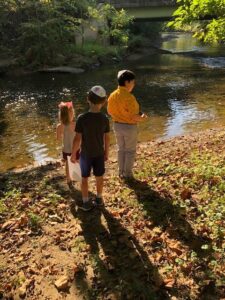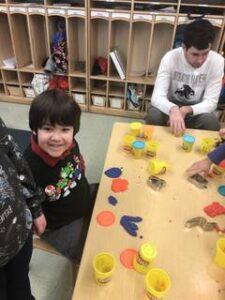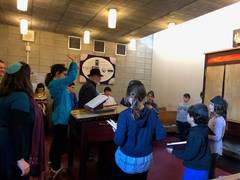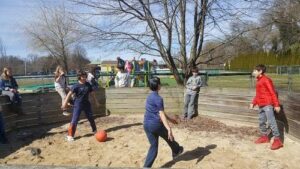


Our curriculum is designed with several basic elements, which are detailed below. It has been crafted with the intention of creating opportunities for many different kinds of learning – project-based learning, creative expression, movement, alongside more traditional modalities.
Each grade covers a particular time period or area of study. This provides a consistent “thread” throughout the year that culminates in a final project or presentation.
The Early learning through 2nd grade (Kitah Bet) classes share the topic of Shabbat and Holidays. The year cycle provides the “backbone” of Jewish time and practice; and creates wonderful opportunities for including families, as students bring their learning home. The holiday curriculum for both our younger and older (3rd-7th grade) students is a “spiral curriculum”, with each grade exploring new holiday experiences, narratives, observances, and opportunities for personal meaning.
Some of our classes meet as single-grade groups, and others meet as multi-age cohorts. The combined classes study together for 2 years under the same teacher, and have an alternating curriculum.
| Grade Level | Topic |
|---|---|
| Early Learning | Holidays and Shabbat, Introduction to some Hebrew letters |
| K-1 (Gan-Aleph) | Holidays and Shabbat, Beginning Hebrew |
| 2 (Bet) | Holidays and Shabbat, Beginning Hebrew, Global Jewish Community |
| 3 (Gimmel) | Torah (Focus on Genesis and Exodus), Siddur |
| 4 (Dalet) | My Jewish Home & Family |
| 5 (Hei) | Development of Rabbinic Judaism |
| 6 (Vav) | Lifecycle (situating Bar/Bat Mitzvah in a larger life context) |
| 7 (Zayin) | Modern Jewish History, including the Early State of Israel, Jewish Immigration to the US, and the Holocaust |
| Post B’Nei/Kabbalat Mitzvah | Madrichim (teen teacher’s aide) program, Chevruta Learning, TBD! |
Throughout the year, we have whole-school units that focus on specific Jewish character and responsibilities. We search for connections between the content we are learning and the values we are exploring, noticing how our holidays, lifecycle moments, sacred texts, legends, history, and community can help us make good choices.
4th-7th grades also participate in Moving Traditions, a program for students and families to explore Jewish identity and meaning as they prepare for the upcoming milestone B’nei Mitzvah.

We begin introducing Hebrew letters and sounds to our youngest students. Children in our Early Learning through 2nd grade (Kitah Bet) classes encounter the Aleph-Bet in various ways, working towards recognition of all the letters and their sounds. They also gain exposure to and confidence with various songs and prayers.
In 3rd grade (Kitah Gimmel), students work more systematically through the Hebrew alphabet. Our goal is for students to be able to decode (sound out words) with confidence by the end of 3rd grade (Kitah Gimmel). Students in 3rd grade receive a siddur (prayer book) and help lead several prayers at Kabbalat HaSiddur, a special class service in February.
4th grade (Kitah Dalet) through 7th grade (Kitah Zayin) students learn prayer-based Hebrew using their siddur as a textbook. Students learn prayers and explore their meanings through self-directed Hebrew centers, with activities leveled for different abilities. Teachers and madrichim (student helpers) work with students individually or in small groups to help as needed.

Weekday Tefilah
We begin each Sunday and Wednesday session with prayer (Tefilah). The goal of these prayer experiences is not simply to “teach” the blessings and melodies that students will need to know for the future, but to create authentic prayerful experiences that help student connect with the words they are learning. Blessings and prayers are interspersed with discussion and opportunities to share personal experiences. In the older grades, we also explore what it can mean to pray even when you are not sure if you believe in God, if you are sure you don’t believe in God, or if your ideas about God are different from what you read in the prayer book (Siddur).
Shabbat Tefilah
We always invite and encourage students and their families to be a part of our congregational Shabbat services, and we also have several special Mispallelim Class Services (led by 3rd-7th grades) throughout the year. As part of these programs, students lead prayers that they have learned, teach the community about what Shabbat means to them, and share their own interpretations of the Torah portion in a class D’var Torah.
In addition to school-specific Shabbat programs, we also offer monthly Tot Shabbat and Sabbat B’Yachad services geared towards families and children. Please check our calendar and join us for food, music, and prayer as we welcome in Shabbat!

Held during the second half of the session on Wednesdays, electives give students an opportunity for choice and self-expression. Some electives offerings have included:
“On three things the world stands: On Torah, on Avodah, and on Gemilut Chasadim” – Pirkei Avot (Ethics of our Ancestors)
3-7th graders will dive into each “pillar” through a one-off day of learning, exploring Jewish topics and ideas and different aspects of their Jewish idenity. The goal of our Yesodot program is to experience Judaism through many modalities, and to give a taste of some of the traditional and modern ways Jews engage with out religion.
Jewish Text Learning (Torah)
Take a deep dive into the sacred stories and texts of our tradition, and practice the ancient art of learning in chevruta. They will also create responses to their learning through visual art and creative writing.
Prayer and Spirituality (Avodah)
Explore ideas about God and Jewish spirituality, and the ways in which our tradition tries to help us connect to something larger than ourselves. They will examine the words in the Siddur, and will also engage in meditation, movement, art, and song as avenues to spiritual connection.
Deeds of Lovingkindness/Social Justice (Gemilut Chassadim)
Learn what our tradition has to say about our responsibilities to others, and will fine-tune their understanding of what makes an effective, ethical, and sustainable service project. The students will use this learning to create and/or participate in hands-on service to the synagogue membership, the local community, and to those affected by larger world challenges as well.
Copyright © 2025 Ohev Shalom. All rights reserved. Website designed by Addicott Web.